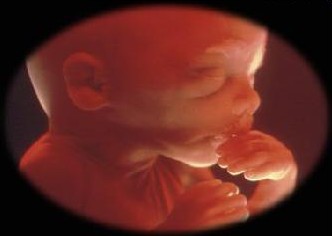Beginning the sixth month
I had my monthly exam this morning. Holly said everything looks great. She suggested I take some Tylenol cold and sinus for my sinus infection and said if it's not helping by Thursday to give her a call and she'll prescribe something. She's trying to hold off on it since anything she can prescribe will make my (ahem) stomach virus worse.
She has brochures in her office for the new 4D sonograms. It would be totally cool to have one done, but even with the discount offered to her patients, the tech would still charge $150. I'm interested, but not that interested.
A couple weeks ago, Jay was at Holly's office in the evening helping her with a couple of her computers. She had him call me to have me come in so that she could do a sonogram so that he could see the baby. During that sonogram we saw the baby practicing breathing. It was awesome. His little mouth was opening and closing and the lungs were expanding and collapsing. What an amazing sight.
Here's what American Baby has to say:
Your fetus now looks like a miniature of the newborn he will become. It's thin, with wrinkled, translucent skin that's covered with vernix. Under the skin, sweat glands are forming.
Everything grows stronger this month. Your baby's bones, relatively soft and flexible until now, are storing calcium and becoming hard. When you feel your baby move, you now may be able to distinguish a tiny limb from the head or buttocks. Your baby's heartbeat is also strong enough for you and your doctor or midwife to hear it clearly with a stethoscope. A fetal heart beats 120 to 160 times a minute, as it pumps what amounts to 25 quarts of blood each day through your baby's body. . .
Your baby's hearing continues to develop, and you may notice that loud noises startle her. A full-term newborn seems to recognize and turn toward her parents' voices.
Toward the end of this month, an important change takes place in your baby's lungs. During pregnancy, you breathe for your baby. Oxygen in your blood is exchanged with carbon dioxide in your baby's blood through the placenta. While your baby's lungs don't function until he's born, preparations for breathing begin now. Cells inside the lungs begin to make surfactant, a fatty substance that helps a newborn breathe. Surfactant keeps small air sacs in the lungs slightly inflated, which makes breathing easier after a baby takes his first crucial breath.
As the second trimester comes to an end, your baby is 10 inches long and weighs about 1 1/2 pounds.








0 Comments:
Post a Comment
<< Home